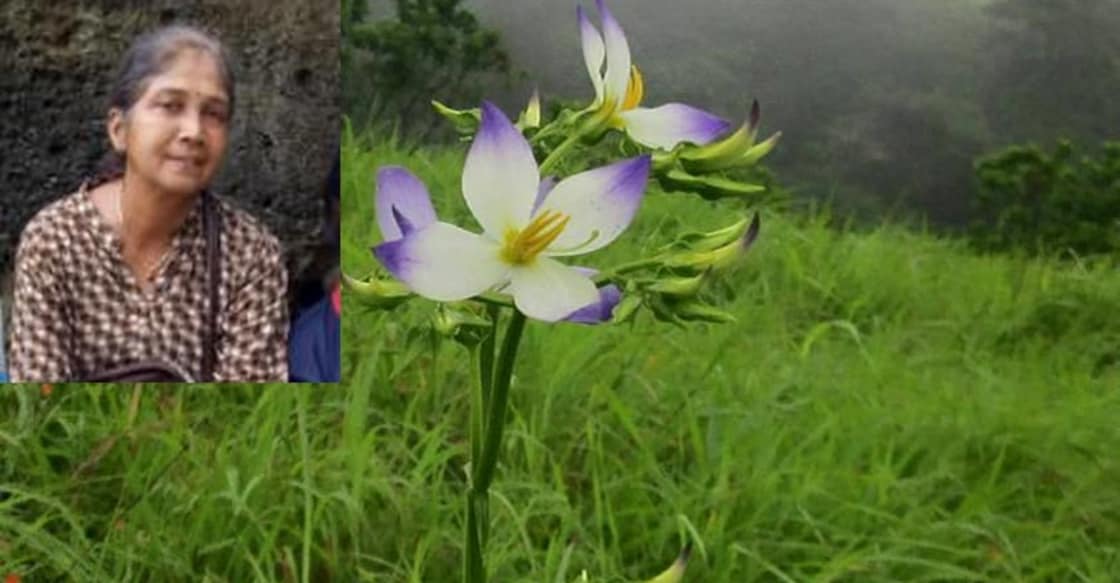Now, endangered Kannamthali, Kayampoo set to grace your gardens

Mail This Article
Thrissur: Kannamthali and Kayampoo are not unfamiliar to Keralites. If they have not seen it, they would have at least heard of it.
Once a common herb found on hillocks and courtyards, Kannamthali has been a favorite muse of poets and lyricists. “Kannamthali muttathe poothumbi kunjaathole..” calls a popular song from the movie 'Agnisakshi' (1999.) It is a carefree wild herb that grows along forest streams and valleys. “Kannathaliyum Kattu Kurinjiyum/Kannadi Nokkum Cholayil...”, is how Bichu Thirumala begins his classic song for the I V Sasi-M T Vasudevan movie 'Anubandham'.
The lush green stalk and its fragrant white and violet-edged blossoms do attract colonies of bees and butterflies. But alas, the medicinal herb which is used to heal skin diseases, irritable eye and a host of other common ailments is on the verge of extinction due to widespread habitat depletion. Kannamthali (Exacum bicolor) is now marked as an 'endangered endemic herb' by the department of horticulture, Kerala Agricultural University.
It is in this context that Sreelatha U, head of horticulture and floriculture department, Kerala agricultural university, constituted a team to revive the endangered endemic flowering plants and acclimatise them to the modern garden environments. “There are two ways by which we could conserve plants. One is in-situ conservation where a plant is conserved in its natural habitat. As Kerala is losing its hillocks day by day due to rampant deforestation, unscientific quarrying and land leveling, we chose the second method; ex-itu conservation. We re-populated the plants in induced habitats and acclimated it to gardens,” Sreelatha said.

Kannamthali takes at least five months to mature and start blooming. While this is too long a period for garden-plants, Sreelatha got new plants tested in all the four seasons and assured their optimum garden performance. Sreelatha started her project to conserve Kannamthali in 2005. She says that the herb has almost vanished from the places where it was seen in abundance in the last decade. She marked a shocking 50 per cent fall in its population by 2015. “It is hard to follow the natural proliferation process of Kannamthali, which is through pollen grains. Its pollen are as minute as tea dust that we could barely collect enough of them to package and sell. So we nurture them in the nursery and sell out as saplings,” she says. An average Kannamthali flower will be 4.5 – 5 cm wide. It also grows in the Konkan belt, apart from Kerala. Though Kannamthali plants dry off after a blooming season, they regrow from the dry stalks during next monsoon.
Another endangered plant which has been conserved in the same manner is Kayampoo (Memecylon Malabaricum.) Its violet spiky flowers have been famously compared to eyelashes. ('Kayaamboo kannil vidarum...', Vayalar had famously wrote for the film 'Nadhi'). Considered both as a small tree and a large shrub, Kayampoo blooms only once in a year. Its thick velvety violet flowers has an unmatched fragrance. Kayampoo has yellowish green stalk and lush boughs.

Sreelatha is on a mission to repopulate the endemic herbs which are on the verge of extinction. Kashi Thumba (Leucas Zeylanica) and Karinkurinji (Strobilanthes Heyneanus) are some of the other endangered flowering herbs which she is working on.
“We could very well decorate our garden with native flowering plants. This could save them from extinction. Nature conservation starts from such simple steps that you could do effortlessly in your courtyards,” says the 56-year-old Thrissur native.


